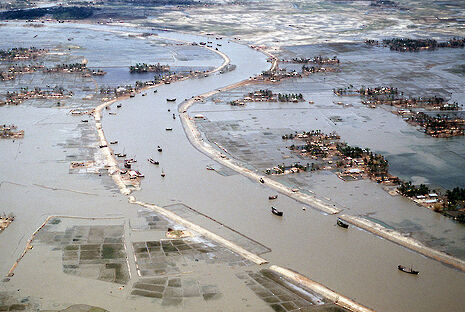Climate change is already happening – we need to act now
It might be difficult, but we need to tackle the problem head-on. Failure to do so can only have dire consequences, says Felix Peckham

The planet – our beautiful oasis of mountains and valleys, streams and oceans – is on the brink of irreversible disintegration. Already, humans have succeeded in purging many of the intrepid creatures that dared to get between man and his gun, fishing net or, nowadays, car. Who is next in the global cull? Perhaps it’s the polar bears, whose icy habitat is receding beneath their feet. As gargantuan cargo ships trawl the sea lanes and inconceivably large aeroplanes crisscross above our heads, the polar bear is dying along with our planet.
Climate change will be the defining issue of my generation. Attempting to prevent the total collapse of our precious ecosystem is the mighty burden that older generations have passed down – a product of their insatiable greed, inconceivable ignorance and infuriating complacency.
This task is not to be underestimated – it is herculean in nature. The consequences, already firmly in motion, are immeasurable: uninhabitable cities as a result of rising sea levels, and excessive temperatures, food insecurity for a ballooning population, the breakdown of food chains and the extinction of the animals who co-inhabit our planet.
“When it comes to the climate, and our response to the impeding and ongoing crisis, there is too much positivity, or, to be more precise, too much ambivalence and ignorance”
Ironically, as the threat from climate change becomes ever more precocious – two million square kilometres of ice have vanished from the Arctic in less than 40 years – global inaction is on the rise. This is no better evidence than by the fact that the orange freak in the White House is oblivious to this threat to our very existence.
Equally, the UK’s vote to leave the European Union is a blunt rejection of the internationalism and cosmopolitanism that is necessary to combat this almighty challenge. The EU is flawed, but its tightknit bond between prosperous and powerful European nations was a ray of hope in this spiralling black hole of fatalism.
Two years ago I had the privilege of travelling to Toronto to be taught about climate change – its causes, consequences and the solutions – by former US Vice-President Al Gore. For those who are concerned about the jeopardy our planet is in, Gore is our hero. He has succeeded in raising and promoting the dialogue around climate change and how best to address it; yet the general condition of the movement in favour of raising awareness, and providing a solution for climate change, is still barely a whisper. This is of particular importance when compared to the cacophony of noise generated by the industries reliant on fossil fuels, and who have a vested interest in not divesting their energy production.
Gore, a passionate and gregarious speaker on all things climate change, laid out the starkness of the situation that lay ahead for humanity. The reasoning for the conference being hosted in Toronto was an attempt to reshape the Canadian dialogue on climate change ahead of the then upcoming elections, with Canadians having a choice between the ‘climate criminal’, Stephen Harper, or the liberal Justin Trudeau, who wanted to cut Canada’s carbon emissions, largely from their tar sands industry. While Trudeau went on to win the election, the election of a climate-sceptic and general ignoramus to the presidency of the USA, the world’s second-largest greenhouse emitter, somewhat lessens this victory.
One particularly rife myth is that attempts to prevent the further warming of our planet will be tothe detriment of our economy. Evidence suggests that the economic benefits of addressing climate change far exceed the costs. The switch from fossil fuels to renewable energy would create hundreds of thousands of jobs in the United States alone.
A major impediment to the global movement to address climate change is politics and politicians. Addressing climate change is a politically unpopular idea, despite having widespread pubic support and almost unanimous scientific support about its perils. Politicians have no incentive to address climate change in the short run, disrupting the work of many of the most powerful corporations that shape our political discourse. It’s also an impossibly hard sell to an electorate, given that day-to-day issues such as healthcare and wages are more evocative than the vague and the almost unbelievable idea that our planet is fundamentally and catastrophically withering away.
When it comes to the climate, and our response to the impeding and ongoing crisis, there is too much positivity, or, to be more precise, too much ambivalence and ignorance. In this instance we need more cynicism, for the stakes are high and time is short
 News / Judge Business School advisor resigns over Epstein and Andrew links18 February 2026
News / Judge Business School advisor resigns over Epstein and Andrew links18 February 2026 News / Gov grants £36m to Cambridge supercomputer17 February 2026
News / Gov grants £36m to Cambridge supercomputer17 February 2026 News / Hundreds of Cambridge academics demand vote on fate of vet course20 February 2026
News / Hundreds of Cambridge academics demand vote on fate of vet course20 February 2026 News / CUCA members attend Reform rally in London20 February 2026
News / CUCA members attend Reform rally in London20 February 2026 News / Union speakers condemn ‘hateful’ Katie Hopkins speech14 February 2026
News / Union speakers condemn ‘hateful’ Katie Hopkins speech14 February 2026









